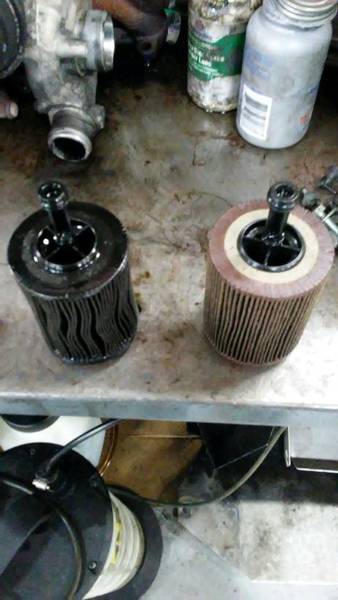I didn't stay at Holiday Inn, so my input probably won't mean much.
I assume it's one of the V-10, -8 or -6 engines... My single thought with the V-10 in particular, is the cylinder wall is Alumasil, which means there is no boring the block or oversize pistons... Nothing like that. So, the real question is, what's best for the aluminum block and it's alumasil surface? If there is some claim of superior life with the alumasil, I'd use that oil.
Now, for the second part of the question... oil weight. My contention about oil weight is that CAPA seems to have too much to say about the viscosity. Since there is a push for better fuel economy, year-by-year, one of the techniques is to use thinner oil to reduce whatever parasitic drag viscosity may incur.
I think the loss in economy is very slight, going from a more conventional 5-40 instead of the 5-30. And, the 5-30 designated is low ash, which for example, Rotella T-6 always touted, so the DPF will not be adversely affected. But the bigger issue from the engines I have seen, and again, this is little to do with the V series engines, but the common rail 2.0 engines I have opened up show excessive piston/ cylinder wear compared to the previous ALH and PD motors. I attribute this to what seems to be higher cylinder temps and the thinner oil.
In my opinion, unless you are hampered by a warranty that requires you to run the 5-30 weight oil, I would be looking for a 5-40 weight, low ash oil. I do think Schaeffer's meets the bill.
I will note, the 507.00 oil intended for the common rail does not need the additional sacrificial elements found in the 505.01 oils, as an overhead cam would need, but the 505.01 oil will be better for the cylinder bores. The addition of that moly-disulfide should make no real difference to a rocker/ roller cam, as there are in the 2.0 common rail engines.
In all, this is only a personal opinion, developed from what cylinder wear I've seen in the most common, common rail VW engines, the 2.0 CBEA and CJAA. I have never seen any cylinder bores for any of the EA288's or any of the other V series engines except the V-10, which I show little interest in going there ever again.

